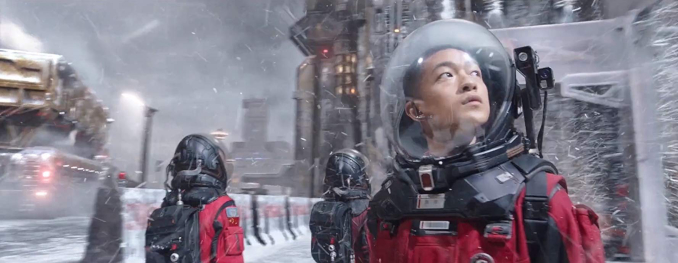Food for the Soul: The Wandering Earth

“What’s the use of a fine house if you haven’t got a tolerable planet to put it on?”
— Henry David Thoreau
By Nina Heyn- Your Culture Scout
The movie The Wandering Earth has already made history as the first Chinese sci-fi blockbuster which garnered $650 million in its native country, and marks the Chinese entry into the genre that has so far been dominated by American blockbusters. While sci-fi movies have been made in China for decades, they largely have remained rooted on Earth, featuring monsters, aliens, robots and mutants in various tales, mostly made with moderate, independent budgets.
The Wandering Earth marks the launch into space in Chinese cinema and does it with a great technological ambition. The movie does take many pages from sci-fi action and disaster movies by Roland Emmerich and Michael Bay, but it is based on a novella by a Chinese sci-fi author Liu Cixin, and it has some Confucian undertones of the sacrifice for the common good, and father-son obligations that give it an interesting, non-Hollywood flavor.
The premise of this tale is quite daring if scientifically a bit too presumptuous – since the Earth and the entire planet system are about to be destroyed by Sun’s activity, the only solution for mankind was to band together to propel the planet outside the Solar system. Underground cities have been built to house population away from fierce climate changes on the surface, the planet is propelled forward by underground thrusters, and an international space station serves as a guidance system to aid the planet in its journey. If the science of this story sounds a bit shaky, we only have to remember The Armageddon (landing a crew on a meteorite), or Interstellar (going in and out of the black hole unscathed) to ignore the improbabilities in order to focus on the action. Enter the protagonists – an astronaut Liu Peiqiang (played by martial arts star Wu Jing, the hero of the movie Wolf Warrior 2) who is stuck on the space station while his 17-year-old son Qi, resentful of being “abandoned” by his father, decides to explore the earth surface with his adoptive sister (a token “girl in the movie” if we ever saw one), joined at some point by his grandfather (great veteran actor Ng Man-tat), and a brave if non-compromising commander Wang (Li Guangjie). There would be no disaster sci-fi movie without an impending doom as the Earth starts being pulled towards the surface of Jupiter, numerous sacrifices of minor characters, and the final desperate attempts to overcome technical disasters, failed heroic actions and general human frailty. There is even an obstacle of an all-powerful but rebellious computer in a great homage paid to Hal, the rogue computer from Kubrick’s 2001 The Space Odyssey.
This being a first attempt by Chinese filmmakers at such a large canvas of a space adventure, the daring action and large machines overshadow the characters and their dramatic arcs. The movie is not up to the high emotional bar of sci-fi masterpieces from Ridley Scott (Alien, Blade Runner) or Chris Nolan (Interstellar) but this will presumably eventually come to pass as this genre matures for China’s filmmakers. Besides, Asian movies generally tend to have less subtle gradation of emotions. When people despair, they break out in tears which are unthinkable in stoic Hollywood action males, and when a character is raked with guilt or needs to take responsibility, the honorable solution is often a sacrifice of life or property, again not that common in “saving-lives-at-all-cost” tales in Western movies. It is therefore not fair to judge the (somewhat) simplified emotions of The Wandering Earth characters with an eye of a viewer used to stoic-heroic characters in Hollywood disaster movies.
What we can judge and enjoy are the high quality special effects that include a frozen Shanghai, some gigantic earth engines that push the planet forward, mining and transportation machines, an underground city, a space station etc. – all these creative visuals that propel the story to quite an entertaining spectacle. Numerous veterans of the SFX field have participated in this production (Weta Workshop, Digital Domain etc.) but it is still impressive how young and relatively inexperienced filmmakers (director Frant Gwo, cinematographer Michael Liu and others) have managed to make these digital toys make us believe in races against nature in monster trucks and the Earth crust crumbling under Jupiter’s pull. Interestingly enough, American space dramas assume that when the Earth is ravaged, one has to be a colonist again, abandon Earth and search for new planets (Interstellar, Passengers). In this Chinese movie, the Earth is busted all right but mankind still insists on dragging it with them. In Chinese culture you never really abandon ties to your birthplace…
The other distinctly Chinese cultural trope is brought by the relationship between the father and son – the father is torn between professional duties and love of his family while the son resents his father but finally accepts his responsibilities. These themes and the overall message of people’s unity and sacrifice to save the community of mankind are all in line with both the traditional Confucian teachings and the current ideology. However, The Wandering Earth mostly avoids the direct, patriotic tone of recent action blockbusters of Wolf Warrior 2 or Operation Red Sea which makes for lighter watching, so to speak. What is conspicuously absent from the story is any mention of Americans (as a nation or a space crew), replaced by a friendly Russian astronaut and representatives of a few nations (France, India, Australia etc.).
The movie comes exactly at the moment when the Chinese space program has enjoyed a triumph of being the first nation landing on a dark side of the moon, and the country is pursuing an ambitious space program of its Chang’e probes and orbital launches to explore space at the same scope and rate as other superpowers. It is for that reason that it is important to take a look at this entertaining milestone in Chinese filmmaking. Space movies are here to stay for Chinese filmmakers (and public). In fact, Liu Cixin’s popular alien invasion saga The Three Body Problem is apparently headed for a film adaptation by Amazon. So far, the rival streamer Netflix has made the first call, picking up the US distribution of The Wandering Earth which means that if you blink and miss the theatrical release (only in limited runs, mostly in Chinatown neighborhoods of big cities) you can still see it soon. The impressive special effects might possibly be less impressive at a computer screen near you but it looks like there is more fun to come from China on the subject of space adventures.
Check It Out!
